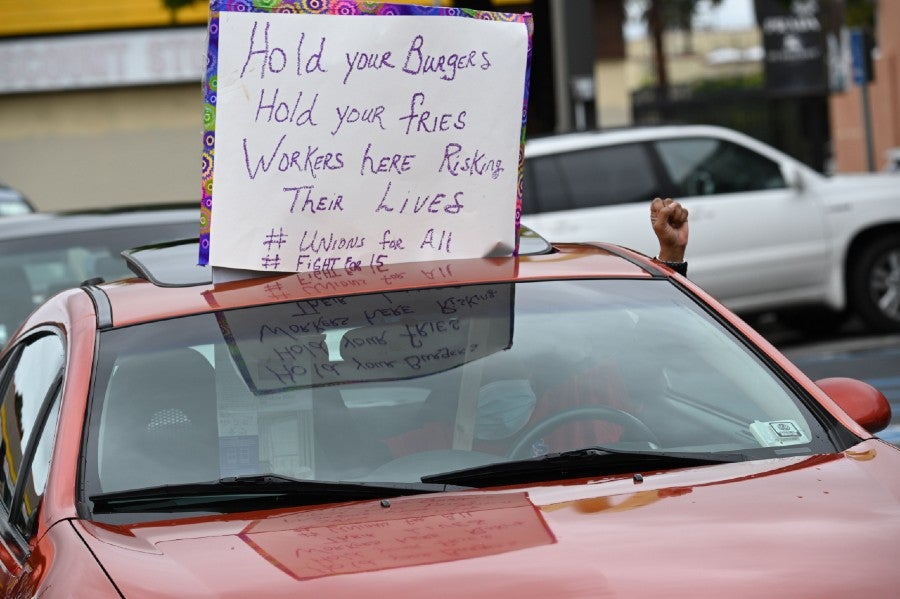
I have been captivated lately by a viral clip of Popeyes employees smacking the stupid out of some of its uncouth customers. Some of that is rooted in me watching it and proceeding to order spicy chicken strips on UberEats later that night anyway—wondering upon its arrival if the person who fried this chicken for me wanted to swing on me, too. If not me or any other particular customer, then certainly the climate in which that person is considered an “essential worker” but is not being compensated as such.
Bernie Sanders may no longer be in the race to become the next president, but his longstanding belief that fast-food workers and every other worker deserves a livable wage was always the right one. And it’s certainly one that’s worthy of championing now more than ever. Although $15 an hour is not really a livable wage in most parts of the country, it is still an improved figure from the paltrier minimum wage found throughout America now. And because of that, for a number of reasons, while I’m not sure if the Popeyes fight video in question is pandemic-related, when I look at the faces of UPS workers, food delivery drivers and cyclists (or their own two feet, bless their hearts for the hustle), and grocery store workers, I see both frustration and exasperation. One only imagines how those working in factories are feeling.
Moreover, it has not been lost on me how many of those faces are only now wearing the masks they should have been handed weeks prior. We’re all carrying some of that with us, but some undoubtedly are bearing heavier burdens than others. It’s no wonder some of those very workers at factories and elsewhere are now protesting for more pay and better safety measures, among other things.
If you are reading this essay, you are doing so from a place of a certain degree of privilege. Maybe not the kind of privilege in which you can be stupid yet somehow paid millions to talk like a Fox News personality whose only requirements appear to be loud, White, racist, and male or at least down for the patriarchy, but privileged in that you have a phone or computer and Internet access that a fast-food worker’s earnings might not fully cover.
The same can be said of many jobs. Yet, somehow, I still see a bunch of folks across social media “debating” whether any of the aforementioned workers who are making our lives less nightmarish by providing us with services we either can’t or won’t do. If you are one of the people doing this, either change your mindset or pour bleach on whatever product you used to spew nonsense during a pandemic exacerbated by inequality.
You should stand with the workers because it’s the right thing to do. There is no indignity in working in fast food or delivering meals or shopping for other folks’ groceries, but there is something despicable in treating people doing the most at our worst as if they don’t ultimately matter. And if you lend yourself to such a nasty attitude, you are not only a fool, but a pawn, reason being, because most Americans are being grossly underpaid and have no real safety net.
A lot of folks have been telling me how “timely” my new book is now, but as I keep telling them, it was timely before the coronavirus pandemic because wage stagnation has been popping in America for at least a smooth four decades. That means no matter how much your earning income is, chances are you’re only one or two checks away from nothing. It was only a year ago that it was reported that 40 percent of Americans didn’t have $400 cash stashed away for an emergency.
And now that more than 20 million have suddenly found themselves with jobs (never mind the gig economy workers not being counted), be kind to your fellow person. Don’t be the fool that says the person who forgot to send me my biscuit the other day (but it’s cool, pandemic) doesn’t deserve more than $15 just because somebody you know doesn’t make a lot in spite of having a bachelor’s degree. You both need a raise, you damn dummy.
Now is the time to exercise not only more compassion but more rationality. After all, if they’re going to pay people less than a livable wage and in some cases be forced to provide safety gear for workers—during a pandemic, of all things—what do you think these corporations will do to you once things return to whatever “normal” is after this ends? Chances are they’ll treat you no less poorly, but it shouldn’t take us being played by the system individually to care about the next person.